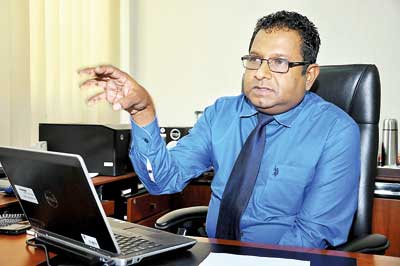Reply To:
Name - Reply Comment
By Kamanthi Wickramasinghe
 Unilever Sri Lanka Customer Development Director Aruna Mawilmada has been a livewire in the industry for over a decade. Having started his career at Unilever Sri Lanka in 1985 in Customer Development (CD), Aruna rapidly progressed through several roles across sales and marketing to reach the position of General Sales Manager of Sri Lanka where he managed the entire General Trade Business of Unilever Sri Lanka.
Unilever Sri Lanka Customer Development Director Aruna Mawilmada has been a livewire in the industry for over a decade. Having started his career at Unilever Sri Lanka in 1985 in Customer Development (CD), Aruna rapidly progressed through several roles across sales and marketing to reach the position of General Sales Manager of Sri Lanka where he managed the entire General Trade Business of Unilever Sri Lanka.
Recognizing him for his talent and outstanding performance, Unilever expatriated him to NAMCA (North Africa, Middle East and Central Africa) as the Regional CD Director. He returned to Sri Lanka and assumed duties in his current role in January 2015. In a candid interview with Mirror Business, Mawilmada spoke of his career and the growth strategies of Unilever. Following are the excerpts:
Firstly tell us about you and how you became such a successful marketer/sales person and an asset to Unilever?
I joined the sales force in 1985 and did a lot of different functions. Then in 2008 I went to work for NAMCA from Dubai. I have been a senior director at Unilever for seven years. The main reason for me to be successful is that I have been consistent in my delivery over the performance. I have got the freedom to implement strategies and I have used it properly to execute my operations. As a salesman there needs to be good trade dynamics to get close to the consumers and it is the best experience I have got. Most importantly I have always been working with big teams and now I manage them. I have always tried to be a practical leader who walks the talk.
How do you distinguish between sales and customer development model adapted by Unilever?
Sales function is a simple task of making products available. Trade has evolved and we have to look at growing categories and brands. We need to target at the ‘shopper insights’ and build them. Shopper insights are at the core of customer development. Currently we nurture new categories and market development strategies. There is also a matter of influencing and incorporating these strategies. We always have to cater to two types of customers, namely in the modern and general trades. This has created a competitive edge.
Do you see fundamental differences in the market place or the environment you operated when you started with Unilever and now?
Yes. Today’s shoppers have resolved and people have started to take whatever the companies say. There is also a huge exposure to media and digital technology and therefore people are very knowledgeable. They are now concerned about the value of products as well as the quality. People would purchase products with the same benefits but at a lower price. Shoppers have become more independent and when taking the market it is a more competitive arena. Therefore, there is a good competition now.
What is your assessment of Sri Lanka’s FMCG market place?
There is a classification between the traditional and the modern marketplace. In the traditional marketplace there is a clear visibility and distribution which is much better in the South Asian context. Sri Lanka is way ahead in this aspect. But still there is an immense opportunity to bring in innovations. Also we have to look at beauty products. In other countries beauty is a major area of concentration. At the same time, the modern marketplace is increasing rapidly. It has shown vast opportunities and is a unique offering for its customers. The small and medium modern trade is also becoming very popular. But currently we need to focus more on beauty and get shoppers to engage in it.
What is the next big thing for FMCG companies like Unilever?
Unilever must take the lead and set trends in terms of customer service. We also need to focus on driving the beauty portfolio ahead and this is one of Unilever’s priorities. We also have what is called the Unilever Sustainable Living Plan (USLP), which is a plan that is aimed to drive profitable growth for our brands, save costs and fuel innovation. This plan has three big goals which are to improve health and wellbeing, reduce environmental impact and enhancing livelihoods.
How crucial is the adaptation of new media in sales and marketing?
Media is the future for sales. Online marketing and e-commerce are pacing the FMCG channel. Consumers are adapting fast to social media but I don’t think Sri Lanka is doing much to broaden this perspective of e-commerce and social media.
What is the next growth strategy for Unilever Lanka? Are acquisitions part of it?
Speaking in terms of customer development, I think while maximizing we need to explore opportunities from the bottom of the pyramid. We need to get to the top. We need to grow our beauty portfolio and food categories. It is also important for us to use the next generation IT solutions. Capability building is another aspect that we have to look at since we are living in a motivated community.
As a marketer/sales person, how challenging is it to work for a multinational?
I have been working for 29 years and it has been a challenge every day. My goal for the day is to do what I’m required to do for a 100 percent. I have been continuously challenged by the competition within the marketplace.